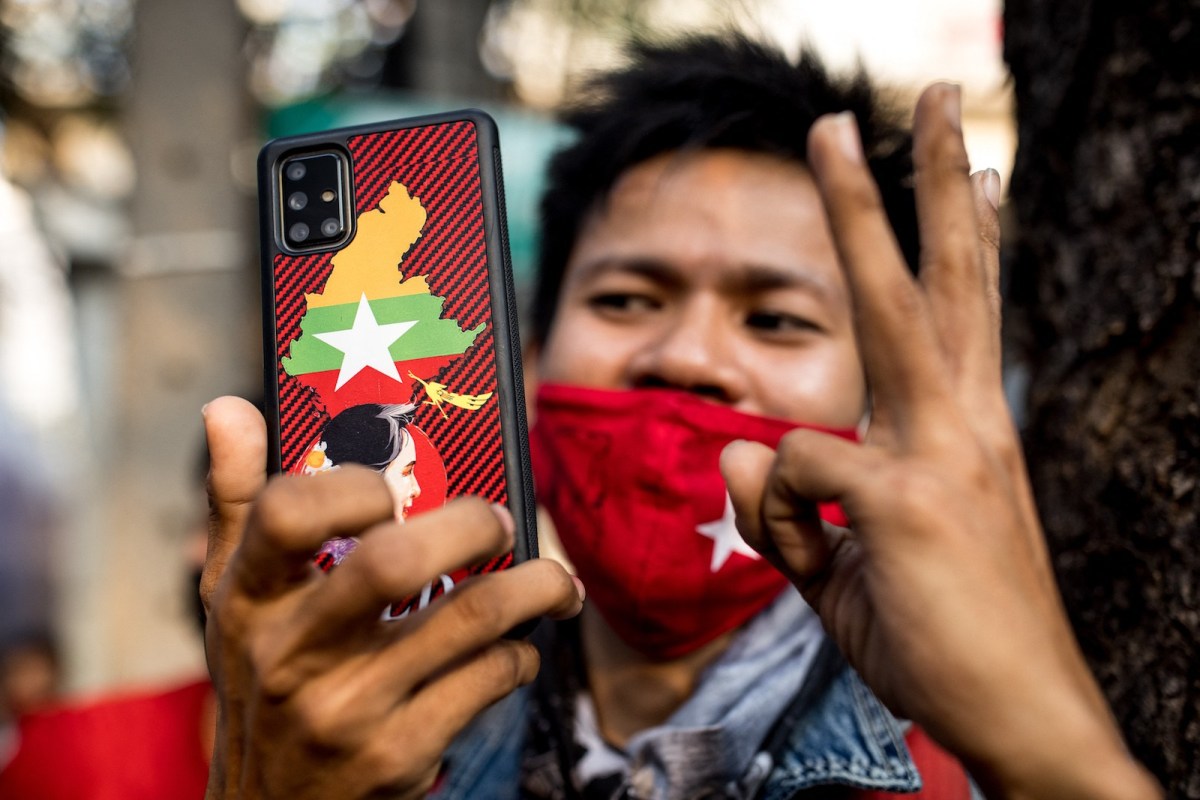[ad_1]
YANGON – Myanmar’s new junta government faces a firm and spirited backlash against draft cybersecurity legislation, with some investors suggesting they may pull out of the country if the punitive law is adopted.
The draft legislation, released a week after the military toppled Aung San Suu Kyi’s elected government, will if passed allow the regime access to online users’ personal data for security reasons and allow authorities to force the removal of any content on platforms that they deem could inspire hate, disrupt unity or harm stability or peace.
The move comes as the junta regime faces widespread dissent against its democracy-suspending coup, a civil disobedience movement that has leveraged the internet and social media to organize and disseminate information about the government’s clampdown.
Around 160 civil society organizations have publicly condemned the proposed law, with many including the Myanmar Computer Federation saying they would refuse to accept it as a legitimate law.
Foreign investors may publicly push back too, with various foreign chambers based in Myanmar now considering to sign a joint letter raising their collective concerns about the online proposals.
Filip Lauwerysen, who founded and led EuroCham Myanmar, has urged the American, Australian, British, European and Hong Kong chambers of commerce in Yangon, as well as other international bodies, to weigh in before the consultation ends on February 15.
“This would be devastating for foreign investors, especially those bringing the latest technology and innovation to the country,†he said. “I would personally strongly encourage the chambers to inform the Myanmar authorities about the negative economic impact this will have on the country, highlighting the many risks and consequences involved.â€
The military regime has already ordered the blocking of major social media sites such as Facebook, Twitter and Instagram, though users can still access through VPNs.
Facebook has been a key tool for mobilizing the ongoing civil disobedience movement, where public and private employees have gone on strike to disrupt the state’s machinery.
After plunging the country into a blackout right after the coup, on February 6, internet service firms including telecom operators were ordered to shut down data networks, resulting in the country having no internet for over 24 hours.
This led to the first large-scale protest, where thousands of people in the commercial capital, Yangon and other cities, took to the streets to demonstrate against the military’s enforced blackout.
There have been reports that the military has sought help from the Chinese government to clampdown on the internet, with speculation rising the coup regime aims to build a “great firewall†similar to Beijing’s.
Soon after a plane allegedly carrying Chinese IT technicians arrived in the country, massive protests erupted outside the Chinese embassy in Yangon. The embassy refuted the claims, saying that the planes were transporting imported seafood and other goods.
The 36-page bill has requested comments “without fail†from telecommunications operators and companies holding telecom licenses in the country by February 15.
Violations of the cybersecurity bill, if passed, would carry fines ranging from 2.5 million (US$1,881) to 10 million ($7,524) kyats, an amount which working- class citizens are not able to afford, or one to three years in prison.
Anyone found guilty of creating fake or incorrect news that causes fear, distrust or loss of respect among the public will face imprisonment of no less than three years, a fine of 10 million kyat or both, one of the punishment reads.
Last Friday, the Myanmar Computer Federation, the organization representing all-computer related associations led by tech-entrepreneur Min Zeyar Hlaing, released a statement “strongly objecting†to the bill.
The fact that MCF, a group representing Myanmar’s IT-related associations, is publicly opposing it would make it politically difficult for the military to quickly implement the law.
The bill could stop all businesses, including SMEs and start-ups, that rely on and utilizing IT-based services, the group said.
Public consultation must be made, opinions gathered from related personnel from the sector, civil organizations and international bills must be referenced, the statement continued.
“[The bill] should only be implemented at the union parliament elected by the people… we observe that now is not a good situation to pass this bill,†the MCF said.
The Yangon-based Myanmar Centre for Responsible Business also warned that the bill could cause some responsible international investors, especially those in the ICT sectors, to “exit the market altogether, or delay or terminate plans to invest or supply services.â€
The provisions in the bill not only pose a threat to human rights and freedom of expression, but also enable the military to arrest anyone, said an SME business owner, who requested anonymity due to the sensitivity of the matter.
“The new cybersecurity bill is an escalated version of the Telecommunications Law section 66(d),†a criminal defamation provision which both Suu Kyi’s government and the military used to silence critics before the coup.
“The internet in Myanmar will be tightly controlled and heavily censored [if the bill is passed]. This has happened before in the 2005 era when Myanmar first got connected to the world. [The people] are deeply concerned that history will repeat itself in the worst way imaginable,†he added.
The NGO Global Network Initiative, a coalition of multinational companies, higher education institutes and non-profit groups, has also called for the Myanmar military to “withdraw and reconsider†the bill.
“Imposing broad-ranging bills under a state of emergency do not meet that standard,†said David Kaye, GNI’s independent board chair.
Many are concerned that Myanmar’s digital space could soon become highly restricted like China’s.Â
“There is a big risk here I sense from telecom players that this could shut down the internet as we know it and its related businesses,â€Â ex-EuroCham Myanmar chief Lauwerysen said, echoing the view of some Myanmar investors.
“It would change the country from having the internet into some kind of CCP [Chinese Communist Party]-controlled intranet.†Â
[ad_2]
Source link













